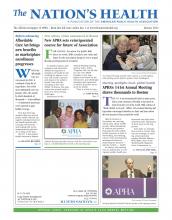Expect to pay more each day to eat healthier than someone with a worse diet, according to a recent study.
It costs $1.50 more each day — or about $550 a year — to eat a healthier diet than a less healthy diet, according to a Harvard School of Public Health study published online in December in the British Medical Journal Open.
Researchers analyzed 27 studies across 10 countries that compared the health of foods versus their costs, given that most studies tend to focus on either one city or one store, said study co-author Mayuree Rao, a junior research fellow at the Harvard School of Public Health’s Department of Epidemiology.
The researchers evaluated food prices per 2,000 calories — the U.S. Department of Agriculture’s recommended daily calorie limit for adults — as well as price per every 200 calories and the price for each serving.
The $1.50 difference presents both a challenge and an opportunity, Rao said.
“The challenge is that for low income families, a $1.50 is quite a lot,” Rao told The Nation’s Health. “It translates to $550 a year for one person and that could be a real barrier. But on the other hand a $1.50 is a drop in the bucket when you consider the billions of dollars spent every year on chronic diseases like obesity and diabetes.”
The study is not the first to gauge the cost of healthy foods. In 2012, USDA examined the issue, finding that it depends on what measures are used, such as weight, calories or cost per serving. That study found that based on portion size, grains, fruits and vegetables are less expensive than foods high in added sugars and saturated fats.
But in the recent study, Rao said the higher price of healthy food was apparent by calorie in diets rich in fruits and vegetables.
“We were just looking at price as one potential barrier, but there are other potential barriers — the time it takes to prepare the food you buy, the potential of lack of availability,” Rao said. “It doesn’t mean it’s impossible to eat healthier for cheaper than that, and it’s possible to eat more expensive. It depends where you shop. The $1.50 is an average.”
Solutions for reducing the price gap include subsidies for people purchasing healthy foods and taxing unhealthy foods, the study researchers recommend.
The researchers also suggested creating a network that processes and manufactures healthier foods on a similar scale to established networks that already mass produce and market unhealthier, processed foods. Those processed foods may be cheaper because of existing policies that “favor sales of highly processed food products for maximal industry profit.”
For more information on the study, visit http://bmjopen.bmj.com/content/3/12/e004277.full?sid=5a0edbad-f17f-4eb5-b9be-765db5fd3065.
- Copyright The Nation’s Health, American Public Health Association









